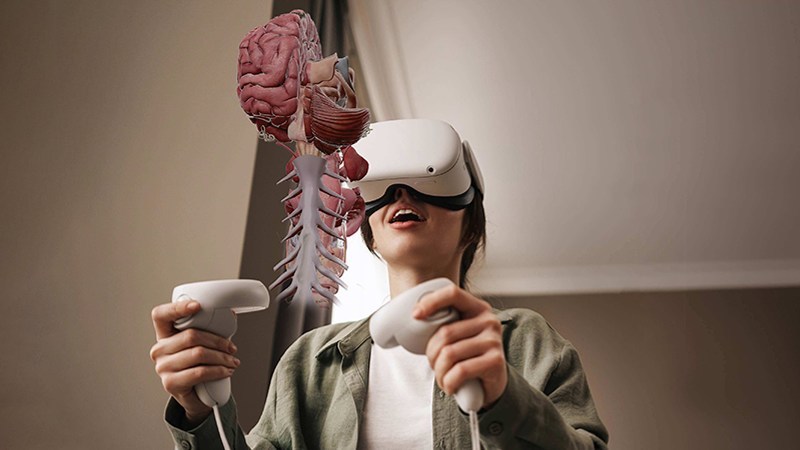Acupuncture, originated in ancient Chinese medicine, has become a well-known complementary treatment worldwide in recent years. To help medical students better understand how it works, Medical Augmented Intelligence, Inc. (MAI), supported by National Development Council, offers advanced technological VR solutions. Their innovations are recognized by several research centers, which led to an invitation to participate in the Alternative Cancer Therapies Research Programme.
During an acupuncture treatment, an acupuncturist inserts very thin needles into specific points on the patient’s body for therapeutic or pain-relief purposes. It involves stimulating sensory nerves under the skin and into the muscles. By relocating users to an immersive virtual environment for a simulation experience, MAI builds a metaverse where health practitioners are able to gain a comprehensive knowledge to solve complex medical issues via acupuncture treatment.
Sam, the CEO of MAI, has traveled extensively around the world and consequently suffered from jet lag, which led to health problems. When he recovered from his illness through acupuncture, he began to wonder what the scientific theory behind acupuncture was. “I really want to know why an acupuncturist treats feet when there is a headache,” said Sam.
Unlike most entrepreneurs, Sam established his own business out of curiosity about acupuncture. His acupuncture practitioner once told him that there is a limit to the number of patients an acupuncturist can treat each day, but the more people learn about the theory behind acupuncture, the more they will benefit from it. Inspired by the acupuncturist, Sam decided to develop VR-based applications that not only help the present and future generations of health practitioners but also the general public.
Founded in 2016, MAI combines medical knowledge and practices rooted in Eastern and Western cultures, with a mission to create high-quality VR-based solutions for the young generations. Their key products provide medical and educational institutions with new, effective teaching and learning methods. Adopting AI and algorithms, AcuMap enables students to visually immerse themselves in a metaverse of acupuncture where they can practice needle insertion and observe how different acupuncture points are connected to sensory neurons.
Another VR application developed by MAI is BodyMap, a medically accurate VR anatomy and simulation training software which provides students with 3D visual images and immersive learning experiences. Unlike traditional textbooks, BodyMap enables future medical practitioners to better understand human organs, nerves, bones, and other body systems by closely observing and even peeking into a 3D virtual model.
With distributors in many countries worldwide, MAI’s VR applications have already served medical institutions in the US, Southeast Asia, Hong Kong, Macau and Europe.
“AcuMap and BodyMap are like Google Maps in the medical field.” Sam pointed out, believing social collaboration is the key to the healthcare industry, “The future of medical education is all about collaborative learning where users are able to socially interact with others around the world.” Social collaboration through advanced VR technology allows medical institutions to extend their existing teaching methods to a new generation of medical education that is more immersive and interactive and less costly.
In the future, not only can medical students break the geographical constraints of learning, but patients can also receive more immediate and efficient treatment. What is more, many diseases that were previously undiagnosed will have the opportunity to be treated through innovative training of medical personnel. To achieve this goal, according to Sam, MAI will work closely with leading medical institutions and experts, continuously developing and optimizing their solutions with new, and innovative features.









